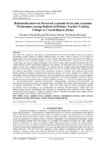| dc.description.abstract | This study was designed to determine the relationship between Perceived Academic Stress and Academic
Performance among students in teacher training colleges in central region in Kenya. It was guided by
Transactional theory and adopted descriptive survey design. The study targeted all second year students in
Public Primary Teacher Training Colleges in central region in 2019. Purposive sampling was used to select
central region, second years‟ students and deans of curriculum. Simple random sampling was used to select 197
students and 20 lecturers and stratified sampling to select gender. The instrument used to collect was perceived
academic stress scale. Academic Performance was inferred from the students mean grade obtained from the
Mid-course examinations Means and standard deviations were used to describe the data while. quantitative data
was analyzed using SPSS version 26. The relationships among the variables was examined using Pearson
Product Moment Correlation Coefficient and regression analysis was used to measure the strength of the
relationship. On the overall perceived academic stress was found to have significant negative effect on academic
performance (r=0.-68, p< 0.01), n=197) Academic performance was found to negatively correlated to specific
measures of perceived academic stress as follows, academic stressors (r =-0.71,p<,0.01),intrapersonal stressors
(r =-0.61,p,<0.001),Social stressors(r=-0.55,p<,0.01), Environmental stressors(r=-0.29,p,<0.01)with the
subscales having significant negative correlations. Perceived academic stress had a significant predictive weight
on academic performance (F, 4,192) =58.5,p, <0.05) with only academic stressors predicting academic
performance. From the findings it was recommended that educators and administrators should ensure that
Students support services like guidance and counselling are strengthened, and is important for the colleges to
develop intervention programs to buffer the negative impact of stressful environments and enhance positive
coping strategies which enhance academic performance | en_US |

